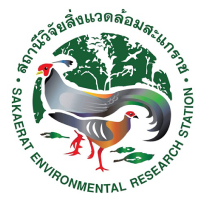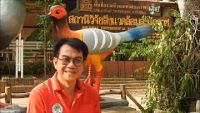บทคัดย่อ :
Ecological and systematic aspects of ballistosporous yeasts inhabiting the phyllosphere of the
Asia-Pacific region were reviewed in the light of recent advances. In the past 20 years, the exten-
sive isolation studies of ballistosporous yeasts were carried out in the Asia-Pacific region, and
the following new species were found in the phyllosphere of the main island of Japan, of the
Ogasawara Islands in the Pacific Ocean, and of Thailand, New Zealand, and the Yunnan Province
of China: Bensingtonia ingoldii, B. intermedia, B. miscanthi, B. naganoensis, B. musae, B. saka-
guchii, B. subrosea, B. thailandica, and B. yamatoana; Bullera boninensis, B. coprosmaensis, B.
hannae, B. huiaensis, B. miyagiana, B. mrakii, B. oryzae, B. penniseticola, B. pseudoalba, B.
schimicola, B. sinensis, B. unica, B. variabilis, and B. waltii; Kockovaella imperatae, K.
machilophila, K. phaffii, K. sacchari, K. schimae, and K. thailandica; Sporobolomyces blumeae,
S. coprosmae, S. coprosmicola, S. dimmenae, S. draycophyllus, S. falcatus, S. griseoflavus, S.
inositophilus, S. lactophilus, S. linderae, S. novazealandicus, S. nylandii, S. oryzicola, S. poon-
sookiae, S. ruber, S. sasicola, S. subbrunneus, S. taupoensis, S. vermiculatus, S. xanthus, and S.
yunnanensis; and Udeniomyces megalosporus. Yeast species containing Q-10(H2), a monohy-
drated ubiquinone, have long been considered to be rare yeasts; however, these yeasts were
proved to be common in the tropical and subtropical phyllosphere of Asia. The chemotaxonomic
and molecular phylogenetic studies based on the sequence analysis of 18S rDNA revealed the
heterogeneity of ballistosporous yeasts, which comprised species with polyphyletic phyloge-
netic origins. A new phylogenetic cluster, Subbrunneus, was newly found in the class Uredin-
iomycetes as the fifth phylogenetical cluster of this class, based on the analysis of 18S rDNA se-
quences. The Subbrunneus cluster comprises four ballistosporous yeast species found in the
phyllosphere of Japan and New Zealand. The future perspectives of basidiomycetous yeast sys-
tematics are discussed.



